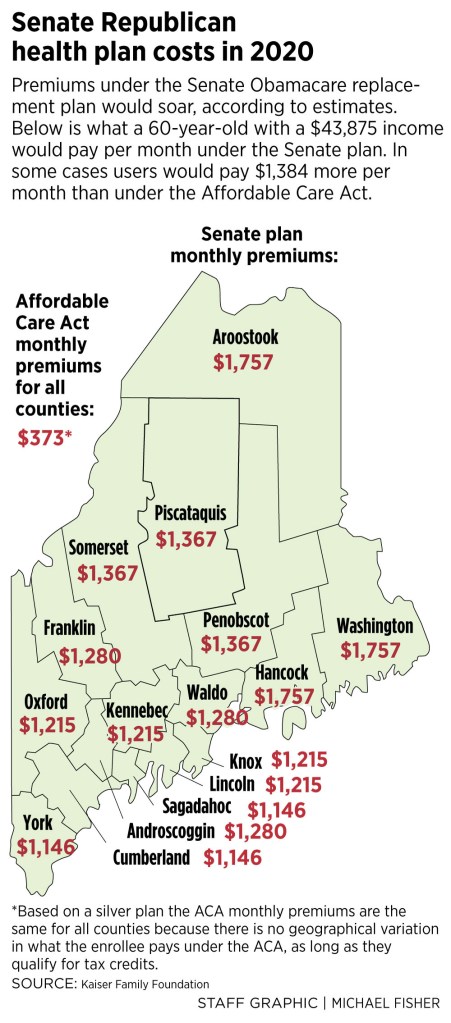Older, rural Mainers purchasing individual health insurance would be socked with massive premium increases if the Senate version of the replacement to the Affordable Care Act becomes law.
For a 60-year-old living in Aroostook, Washington or Hancock counties making $43,875, premiums would soar from $373 a month if the ACA remained intact to $1,757 a month by 2020 if the Senate bill became law, according to an analysis by the Kaiser Family Foundation. The Senate is considering the plan, which was unveiled last week, with a vote anticipated this week.
Sen. Angus King, I-Maine, is opposed, and his Republican colleague, Sen. Susan Collins, issued three tweets Monday night outlining her opposition to the bill and saying that she would vote against a motion to advance it. Her tweets cited the Congressional Budget Office analysis released Monday afternoon that said 22 million fewer Americans would have health insurance by 2026 under the Senate bill, compared to 23 million fewer under a House ACA replacement bill. She also said the Senate bill would hurt the “most vulnerable Americans” and threaten access to health care in rural areas.
In a closely divided Senate, a 52-48 Republican majority, with Democrats uniformly opposed and moderate Republicans like Collins also objecting to the bill, the measure faces an uncertain outcome.
The premiums in the Kaiser analysis represent the cost of a silver plan on the ACA marketplace, which is considered a middle-of-the road plan in terms of covered benefits and deductibles. In Cumberland County, which includes Portland, premiums would climb from $373 to $1,146. The other Maine counties would see similar premium increases, ranging from $1,215 to $1,367 per month.
The Kaiser analysis didn’t rank the counties nationally, so it wasn’t immediately clear how Maine’s premium increases compare to those of other states.
The health insurance premiums would consume almost half of the annual income of 60-year-old Mainers living in rural Washington, Aroostook and Hancock counties earning about $44,000, and 30 percent of the income of an equivalent Cumberland County resident.
“It’s stunning,” said Steve Butterfield, public policy director for Consumers for Affordable Health Care, an Augusta-based health advocacy group. “People aren’t going to have thousands of extra dollars around to spend on health insurance.”
The Senate plan ends tax credits to help individuals purchase insurance at 350 percent of the federal poverty level, or $43,875 for an individual, while the ACA extends the credits up to 400 percent of poverty level.
Butterfield said the result would be thousands more Mainers doing without health insurance. Under the ACA, the national uninsured rate has declined from about 17 percent in 2013 to 11 percent in 2016, according to Gallup polling. Maine’s uninsured rate was 9.1 percent in 2016.
Maine has about 80,000 people who have individual insurance through the Affordable Care Act. About 25,000 of them are in the 50-64 age group that would see the largest spike in premium increases under the Senate bill. That measure allows insurers to charge older people up to five times more than a younger person, while the ACA limits such increases to three times the amount.
Once an enrollee turns 65, they qualify for Medicare and would no longer need ACA insurance.
“This would be devastating,” said Holly Gartmayer-DeYoung, CEO of Eastport Health Care in Washington County, talking about the Senate bill’s outsized impact on rural parts of the state. Gartmayer-DeYoung said many people already have a difficult time affording insurance in Washington County, and the Senate bill would only make that dynamic worse.
“People would be choosing whether to heat their home or buy health insurance,” she said. “If they got a prescription, would they take the medicine as prescribed or take less of it to try to make it stretch?”
She said rural health facilities, already on shaky financial ground, would see many closures. She said Eastport may have to close one of its satellite locations, or reduce the services it offers, such as behavioral health. Eastport Health Care has locations in Eastport, Machias and Calais.
Eastport’s financial solvency would be threatened by the Medicaid cutbacks in the Senate bill, she said, as well as fewer people having insurance. Gartmayer-DeYoung said they accept all patients, even the uninsured, but the more uninsured patients walk through the door, the more financial hardship the organization faces.
Michelle Long, a policy analyst with Kaiser Family Foundation, said with few exceptions, most people would be paying more for health care or going without insurance under the Senate bill, with rural and older people paying more.
“Pretty much everyone is going to be paying more,” Long said. “Many people will choose to go without.”
Long said the Senate is also permitting states to waive “essential health benefits” required under the ACA, which may drive down the cost of insurance, but also would result in far fewer benefits and coverage gaps.
“There is no magic bullet in health care. If you’re paying less, you’re getting less,” Long said.
Joe Lawlor can be reached at 791-6376 or at:
jlawlor@pressherald.com
Twitter: @joelawlorph
Send questions/comments to the editors.



